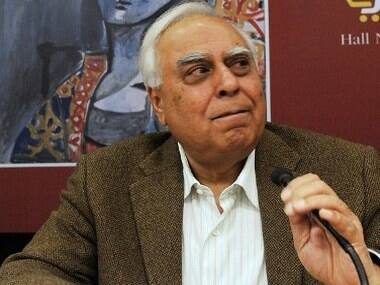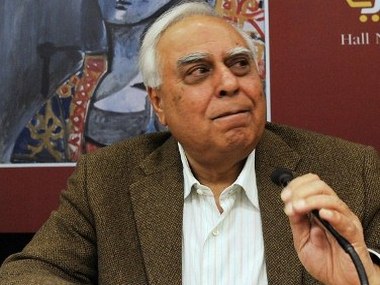The policy confusion in the telecom sector looks destined to continue for a while. Communications Minister Kapil Sibal’s anxiety to push through his cabinet proposal for a one-time auction-determined price for existing telecom players has ignited inter-corporate and inter-ministerial feuds. It has also been strongly opposed by the Prime Minister’s Office, as well as the Planning Commission and law ministries.
“Why are you (Kapil Sibal) in a hurry?” seems to be the tone underlined by three separate notes issued and approved by Prime Minister Manmohan Singh in his new dual role as finance minister, Montek Singh Ahluwalia, Deputy Chairman of the Planning Commission, and Law Minister Salman Khursheed.
[caption id=“attachment_369421” align=“alignleft” width=“380”]
 AFP[/caption]
AFP[/caption]
Kapil Sibal’s cabinet proposal came at a time when a similar query is pending with the Supreme Court in the form of a presidential reference. The reference, hearings on which will resume on 11 July, asks inter alia: “Whether it is open to the government to take any action to alter the terms of any licence to ensure a level playing field among all existing licensees.”
The presidential reference further asks: “Whether it is necessary or obligatory for the government to withdraw the spectrum allocated to all existing licensees or to charge for the same with retrospective effect and, if so, on what basis and from what date?''
Kapil Sibal’s proposal to get a one-time fee on current licensees has thus not only misfired, but also raised a question-mark on the seriousness of the presidential reference.
Not only this. Even the corporate world has started wondering who is going to gain if Kapil Sibal’s one-time retrospective payment proposal gets through the empowered group of ministers (eGoM), which is finally seized of the matter. The eGoM, of course, is currently headless after Pranab Mukherjee’s exit and Sharad Pawar’s refusal to head it after him.
Impact Shorts
More ShortsThe telecom licences of Bharati Airtel and Vodafone are pending for renewal in 2014 and they, in any case, have to cough up auction-determined prices in two years’ time. But other telcos, like Tata, Aircel and Reliance, among others, have seven more years to go, as their telecom licences come up for renewal only in 2020. They stand to suffer heavy financial losses if Kapil Sibal’s proposal goes through.
“Unilaterally changing the terms could be said to violate the contract. Existing operators would argue that they have made huge investments on the explicit understanding that the spectrum was allotted to them for a certain period on certain terms, and the investments made were to yield returns over the period as a whole,” a note from the law ministry says.
The ministry’s note adds that the telecom ministry can invoke its powers to modify the UASL (unified access service licence) at any time. But this power should be exercised “only if in the opinion of the licensor (i.e. the government) it is necessary to do so in public interest or in the interest of the security of the state or for the proper conduct of the telegraphs.''
“Whether the stated ground of providing a level-playing field among the existing and new players is of such overriding public interest (as) to warrant the change in licence terms and conditions will be open to litigation,” warns the law ministry note.
Kapil Sibal’s cabinet proposal has given a simple logic and pressed the need for a legislation on spectrum auction, as the Supreme Court’s deadline for conducting the auction is round the corner (31 August).
“Several of the operators who have received spectrum between 1994 and 2009 had paid entry fees ranging from zero to Rs 1,658 crore on a pan-India basis… In a situation where new players would come who will pay for (the) entire spectrum from zero onwards, there will be no level playing field between them and those who received spectrum at (an) administrative price,’’ Kapil Sibal’s cabinet note says.
Thus, Kapil Sibal advocates a one-time charge to their current spectrum holdings and he wants the government to decide on this at the earliest because the telecom service providers need to be informed of the final decision before the commencement of the actual process of auctions. Sibal wants a one-time fee for any airwave - less than 4.4 Mhz or beyond that.
In their responses, Manmohan Singh, Montek Singh Ahluwalia and Salman Khurshid have effectively asked Sibal: Why do you (Kapil Sibal) want parity between existing telecom players and new entrants?
“New entrants in any sector are likely to face different conditions in terms of business environment,’’ says the finance ministry’s (read: Manmohan Singh’s) note. He adds: “Government has the power to change the licence’s terms and conditions which are binding on the licensee. However, the government has allowed up to 4.4 Mhz/2.5 Mhz in GSM/CDMA and further from 4.4 Mhz to 6.2 Mhz/2.5 Mhz to 5.0 Mhz as initial/startup spectrum and contracted spectrum as part of the licence issued to incumbents. By doing so, government has acquired certain contractual obligations for the duration of the licence. A careful assessment of the impact on investor sentiment that frequent changes in contract terms may have would be useful. The impact on foreign investors is also important.''
Not only the Prime Minister, even other ministerial colleagues of Kapil Sibal strongly voiced their opinion against the level playing field idea.
“It is not at all obvious that auctioning future spectrum and leaving existing arrangements unchanged will deny new players a level playing field. Players who bid for the auction now will take into account the competitive position of incumbents, (and) will bid only the amount that enables them to retain competitiveness. New players always face different circumstances in several dimensions and a level playing field does not mean that all these differences have to be evened out. The issue, therefore, is not one of competitive advantage but whether the government feels that incumbent should continue to enjoy unpriced spectrum,’’ law ministry says.
Montek Singh Ahluwalia says that Kapil Sibal’s ministry is ignoring the Telecom Commission’s (TC) recommendations and it is advisable to wait for the Supreme Court’s order on the presidential reference. The TC has recommended that spectrum allocated (including 0 to 4.4 Mhz) at the time of extension of existing licences will be charged. And spectrum beyond the 6.2 Mhz already allotted may be charged prospectively from the date of decision by the government in this regard at the price to be discovered through auction.
Kapil Sibal’s rationale behind his cabinet proposal is that “there should be a level playing field between new and incumbent operators.”
“But the desire to create a level playing field cannot be transformed into a search for a `Procrustean Bed’ in which all supposed past advantages of incumbents are sought to be equalised. All industries see new entrants at different times. New entrants always incur different costs, and very often face different tax environments, from what the incumbents faced,’’ Ahluwalia’s Planning Commission’s note says.
Like Manmohan Singh and Salman Khurshid, Ahluwalia too warned that implementation of Kapil Sibal’s proposal may lead to violation of an existing contract. “Investors invest on the understanding that contractual undertakings of the government will be honoured and in the case of telecom these investments are huge. (The) government’s power to change the terms at any time is indeed a wide ranging power, but it is usually meant to be used in extreme cases,’’ Ahluwalia adds.
The bottomline is the three notes is this: Sibal’s compulsory one-time charge for all airwaves is unacceptable. The government will eventually follow the TC’s recommendations and will rather wait till the Supreme Court delivers its decision on the presidential reference.
)